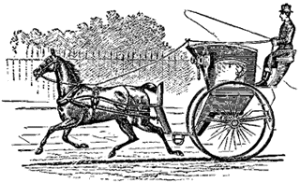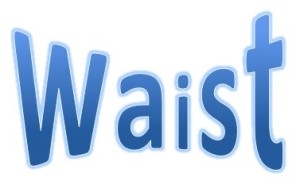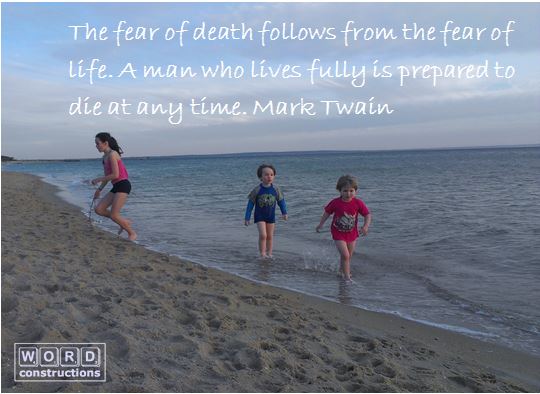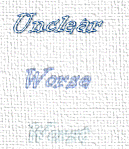I hope you find my writing and business tips and observations useful. My business and blog are dedicated to helping businesses communicate clearly and reach their potential.
Read, subscribe to my newsletter, enjoy!Tash
also comes after
Reading and editing a document recently, I came across the following text as the first paragraph in a new section of the document:
We will also deal with your request for access…
So today’s Monday Meaning is for one word instead of a pair of words.
Also [adverb]: as well as, too, in addition, besides
Please bring pen and paper. Also bring a snack.
Getting back to the example above, it is wrong because ‘we’ can’t ‘also’ deal with a request if ‘we’ aren’t already dealing with something for you.
Words like also and too must follow, or come after, something rather than being the first item in a list.
A hansom boy?
As always, I help Love Santa write and edit some special letters each December.

A 19th century engraving of a Hansom Cab in motion. Hansom cabs were designed to be faster and more agile than older horse drawn carriages.
As I edit, I check the supplied information works in the letters, fix up capital letters and adjust any spelling errors.
In one letter I edited a few weeks ago, I came across a misspelling I’ve never seen before so it has inspired today’s Monday meanings 🙂
handsome [adjective]: attractive, good looking; significant
You are such a handsome boy!
He received a handsome package when he retired.
hansom [noun]: a horse drawn two-wheeled carriage with a covered area which the driver sat behind and above. The hansom cab (named for its design) was the forerunner of the term taxicab and cab that we now associated with hired vehicles.)
Sherlock Holmes jumped aboard the hansom cab and was off!
How to remember which is which?
A hansom cab was designed to be sleek and fast so it has fewer letters than the significant handsome.
Alternatively, you may find it easier to think of a handsome person having a hand which a hansom cab certainly does not!
Monday meanings: a dearth of life
For today’s Monday Meanings, I thought I’d follow on from Friday’s post and my personal recent history by defining death and dearth.
Apart from an obvious similarity in spelling with one letter difference, death and dearth do have a certain similarity in meaning too. neither is a cheerful word and both are about a lack or loss. To me, both give the impression of barrenness, isolation and gloom.
Do you find these words similar or just words that happen to be spelt in a similar way?
Death (noun): the end of life, a cessation of being alive.
Liz was completely alone at the lighthouse after Jack’s death.
Dearth (noun): a scarcity or lack of something
There was a dearth of vegetation and colour in all directions.
Avoiding lots of waste or a big waist?
Today’s meanings were inspired by a blog post where the word waist was used instead of waste. In this instance, I pointed out the error and the blogger was able to fix the post.

A waist goes in, like the provernial hourglass figure, so maybe this image will help you remember which wasit to waste!
waist {noun}: the area bewteen a person’s rib cage and hips; the narrow area of any object that widens at both ends; the part of clothing that covers or sits on a person’s waist
Women used to wear corsets to have a smaller waist than was healthy.
waste {verb}: to use, consume or lose something carelessly or thoughtlessly
Being careless about turning taps off leads Jack to waste a lot of water.
Don’t waste bloggers time when offering guest posts.
Hmm, so how to remember which waist/waste is which? Just think of that little i in the middle of a waist being like the smaller part of a shape.
Are simple messages simplistic?
While being closely related with the same root word, today’s pair of words are quite different – and understanding them can be quite enlightening.
simple [adjective]: basic; missing elaboration, ostentation, complication and subdivisions
Basic arithmetic is simple to write and calculate; quadratic equations are not so simple!
Following main roads is simpler than maneuvering through side streets.
In grammatical terms, simple means having only one clause without any subordinate clauses or modifiers.
simplistic [adjective]: over simplified, missing information or depth
Saying income is the indicator of career success is simplistic.
Just how exhausting is a study?
I recently posted about an exhaustive study of twitter users and it reminded me of another pair of words that can be misused.
exhaustive: covered all angles and possibilities
The SES conducted an exhaustive search of the area but found no traces of the girl.
exhausting: to use or consume entirely, to drain or tire
The two day Problogger event was exhausting so I slept in the next day.
I don’t think exhaustive is used very often now; you are more likely to read about something being comprehensive or detailed. Of course, it has a slightly different meaning to comprehensive which means covering a wide range – it can include most or all aspects.
Is anything worse than doing your worst?
With only one letter difference, today’s words are related but subtly different – and just sound wrong when used in the wrong context. Thanks to Entrapment’s comment a week or so ago, here are my definitions of worse and worst.
Note that both of these words can be used as an adverb, adjective or noun (and worst can also be a verb) so I have given all definitions.
worse:
[adjective] of a lower quality or standard The sight was terrible, and the smell worse!
[noun] more unfavourable or desirable Worse was yet to come!
[adverb] showing less skill or ability She had worse handwriting than you!
worst:
[adjective] the lowest quality or standard The hotel last night had the worst service.
[noun] the most unfavourable or desirable He was yet to face the worst.
[adverb] the most adversely or severely Marytown was the worst affected in the fires.
[verb] completely or thoroughly defeat He came out of that the worst.
The key difference to remember is that worse is poor while worst is the poorest possible. For instance, the flu is worse than a cold but pneumonia is the worst of the three.
Just to twist things a little, do you often think about the worst parts of your business, or concentrate on the best?
Is your presents required?
Unfortunately, I came across the following sentence online last week:
It is true that having an online presents is very important, however it is just as important to have a real life presents.
So today’s Monday Meaning is aimed at correcting that sentence, and preventing it ever being written again!
presents [noun]: something given to another; a gift
The pile of presents reached the branches of the Christmas tree.
presents [verb]: the act of handing over and introducing something or someone
The compere presents each nominee before the awards are announced.
presence [noun]: the existence or occurrence of someone or something in a particular place
The contract must be signed in the presence of two adult witnesses.
To remember which is which, think about the presents you have been sent.
Finding hares in your bathroom
I admit the only times I have seen today’s words used incorrectly is in bathrooms or children’s writing, but is a bathroom notice less important than any other business communication?
Putting up a notice in your public bathroom as part of a policy of keeping them clean and pleasant for all users is fine and can communicate more than the words on the paper. However, a very different message can be conveyed with signs like:
Please keep your hares out of the basins
and graffiti replies such as
Then provide some rabbit hutches for us
But hairs are ok in the basins?
So for the sake of all of us using public bathrooms with hair issues, here are today’s definitions.
 hair [noun]: a long protein fibre produced by animals (mostly by mammals) from follicles in the skin. Humans consider head hair as part of our appearance whilst hair is important for warmth and survival in many other animals. Similar strands (such as on plant roots) are also called hairs.
hair [noun]: a long protein fibre produced by animals (mostly by mammals) from follicles in the skin. Humans consider head hair as part of our appearance whilst hair is important for warmth and survival in many other animals. Similar strands (such as on plant roots) are also called hairs.
Jenny brushes her hair every morning before leaving her room.
 hare [noun]: a mammal belonging to the genus Lepus, similar to rabbits
hare [noun]: a mammal belonging to the genus Lepus, similar to rabbits
The hare is related to the rabbit but does not have burrows for its young and is generally larger.
My tips for remembering which is which – hares are like rabbits while hair is in the air.
Feeling content with contempt?
These three words are completely different, and if said clearly, should never be confused by someone who knows their individual meanings. However, said quickly, these words can sound alike and lead to confusion – do you know the difference and take care to pronounce them carefully?
contend: [verb] taking a position or stand in an argument, competition, contest or effort
The politician contends his position again, hoping his past achievements will win back his seat.
content: [adverb] satisfied, happy; [noun] contained or what is contained
Having finished another 10,000 words, the writer was content with her efforts.
He warily viewed the content of the student’s locker.
contempt: [noun] feeling of disapproval and superiority to something or someone that is regarded as vile, of little account or mean
He treated all criminals with contempt, and never tried to hide the fact.





Recent Comments